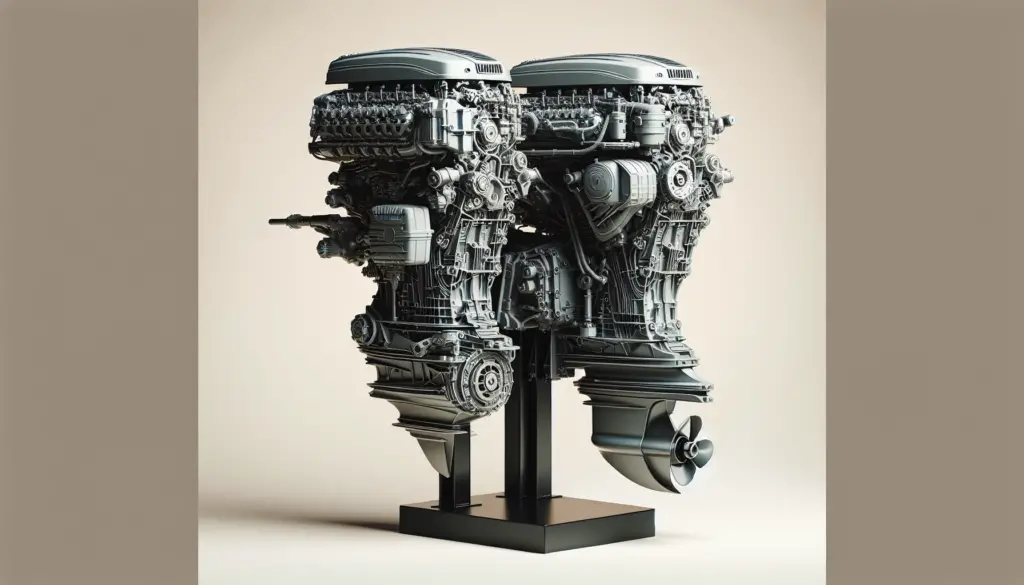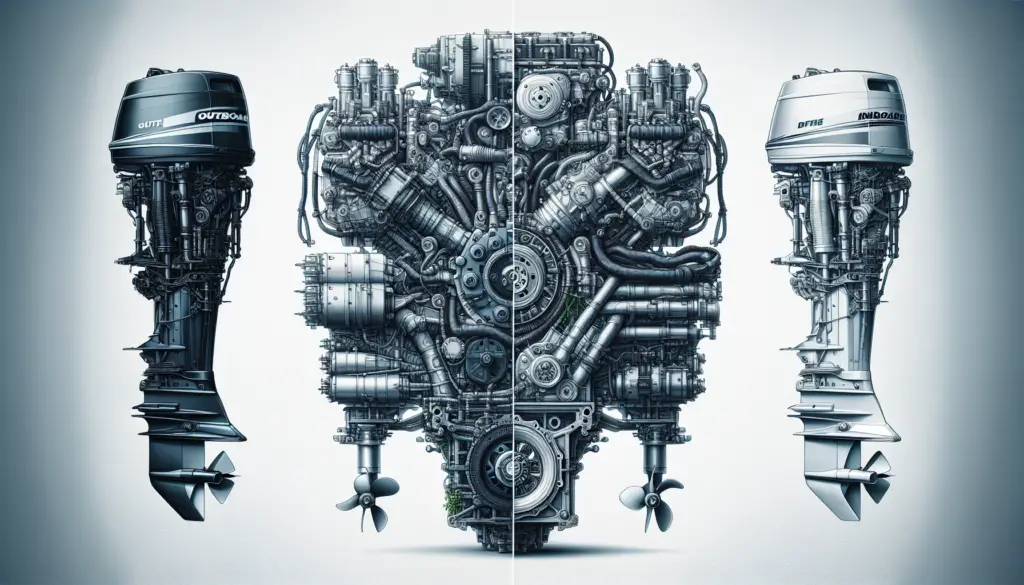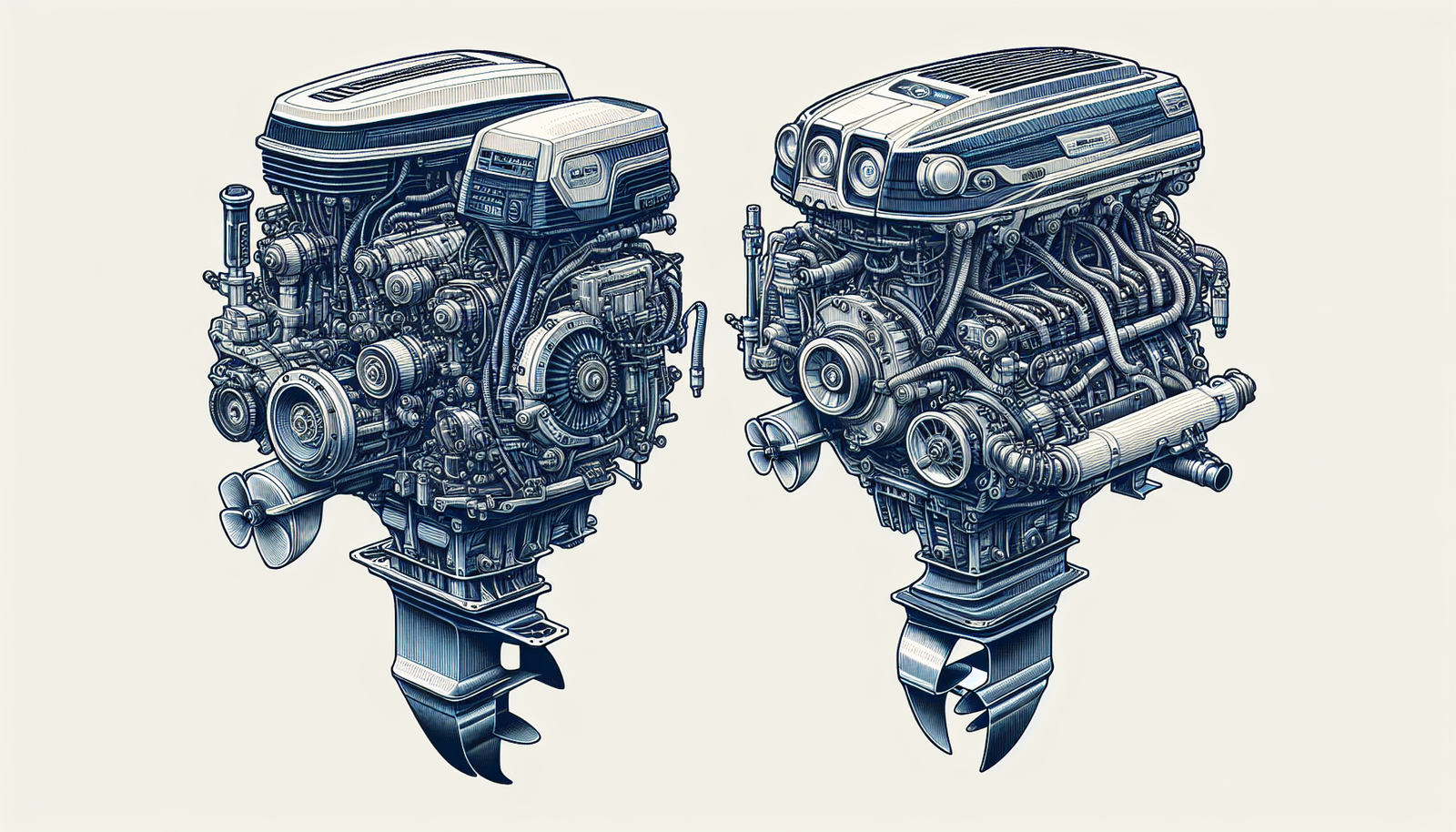As you venture into your next boating adventure, knowing the key differences between outboard and inboard boat engines becomes crucial. “Buyer’s Guide: What to Consider When Choosing an Outboard vs. Inboard Boat Engine” comes to your aid, offering an insightful comparison of these two kinds of engines, covering crucial aspects such as power, fuel efficiency, maintenance, and cost. Navigating the vast waters of engine choices can get complex, but armed with this guide, your decision will be both informed and confident.

Understanding The Basics
Before diving into the details of outboard vs inboard engines, let’s understand the basics first. The most basic difference between these two types of engines depends on where they are mounted on a boat and their design.
Defining Outboard and Inboard Engines
An outboard engine, as the name suggests, is mounted outside the boat’s hull, usually at the stern. It functions as a combined steering, engine, and propulsion system. On the other hand, an inboard engine is mounted inside the boat’s hull. It’s separated from the steering and uses a separate propeller to provide propulsion.
How Boat Engines Work
Without getting too technical, think of a boat’s engine as its heart. It pumps fuel in, which is then burned to create power. This power is transferred to the propellers, which in turn propel the boat. Keeping these engines running efficiently is vital to ensure your boat performs at its best and guarantees safe, enjoyable boating experiences every time.
Understanding Power and Performance
The power of a boat’s engine directly affects its performance. That is, how fast it can go, how smoothly it can manoeuvre, and even how much fuel it consumes. While there’s more to a boat’s performance than just its engine — the hull’s shape and weight also play a critical part — knowing the ins and outs of your boat’s engine, is instrumental in understanding and optimising your vessel’s performance.
Outboard Engine: Advantages
When it comes to outboard engines, they’re popular for a reason. Here’s why:
Portability and Maneuverability
Outboard engines are portable. You can literally detach them from your boat and carry them around. This can be beneficial if you need to transport your boat over land regularly. Besides, their placement on the boat also makes it easier to manoeuvre, especially in shallow waters.
Ease of Maintenance and Repair
With their accessible location, maintaining and repairing an outboard engine is relatively easier. You don’t have to crawl into cramped spaces to inspect or work on the engine.
Economy of Fuel Consumption
Outboard engines are generally more fuel-efficient than inboard engines, which can result in long-term savings, especially if you’re planning on doing lots of boating.
Outboard Engine: Disadvantages
However, like everything else, outboard engines have their drawbacks.
Limited Horsepower
While modern designs have radically improved the performance of outboard engines, they still generally offer less power than their inboard counterparts. This could be a concern if you need a lot of horsepower for your boating activities.
Noise and Vibration
Outboard engines can be quite noisy and generate a lot of vibration. This could be a bother if you prefer a quiet and smooth boating experience.
Lifespan Concerns
Outboard engines typically have a shorter lifespan compared to inboard engines. The exposure to harsh marine conditions and inability to effectively dissipate heat may contribute to this shorter lifecycle.
Inboard Engine: Advantages
On the flip side, let’s examine some of the key advantages offered by inboard engines.
High Power and Speed
Inboard engines are typically more powerful than outboard engines. That means if you’re after speed or need to power a larger vessel, an inboard engine could be the way to go.
Durability and Lifespan
Inboard engines are generally more durable and have a longer lifespan than outboard engines. Being mounted inside the boat’s hull provides them some protection from the harsh marine environment, contributing to their prolonged lifespan.
Quiet and Smooth Operation
Due to their location inside the boat’s hull, inboard engines are known for their quiet and smooth operation. The hull helps in muffling the sound and absorbing the vibration generated by the engine, making your boating experience more pleasant.

Inboard Engine: Disadvantages
However, inboard engines aren’t perfect either.
Complex Installation and Maintenance
Due to their location inside the boat’s hull, installing and maintaining an inboard engine can be complex. It may require professional assistance, which could increase your maintenance costs.
Higher Initial Cost
Inboard engines are generally more expensive than outboard engines. However, this higher initial cost might be offset by its longer lifespan and potential resale value.
Space Requirements
Installing an inboard engine can take up a considerable amount of space inside your boat. If you have a small boat or value every square inch of internal space, this could be a significant drawback.
Understanding Your Boating Needs
When making the choice between an outboard and inboard engine, it’s essential to understand your boating needs.
Considerations on Boat Size
The size of your boat is a critical consideration. In general, smaller boats tend to be better suited to outboard engines, while larger vessels often require the power of an inboard engine.
Geographical Location and Weather Conditions
Where you plan to use your boat and the weather conditions prevalent in your area also play a part. If you frequently navigate rough waters or need to power through strong currents, an inboard engine might be more suitable.
Purpose and Frequency of Use
Your usage intent and frequency also matter. If you use your boat for slow, relaxing cruises, an outboard engine might be enough. But, if you’re into water sports or regularly haul heavy loads, you might need the additional power provided by an inboard engine.

Comparative Analysis: Outboard Vs Inboard Engines
Knowing the pros and cons of both types of engines is one thing. But how do they compare to each other in various aspects?
Comparison in terms of Performance
In terms of sheer power and speed, inboard engines generally have the upper hand. However, for manoeuvrability and ease of handling, especially in shallow waters, outboard engines are superior.
Comparison in terms of Maintenance
Outboard engines generally come out on top in terms of ease of maintenance and repair, thanks to their external placement. Conversely, inboard engines, while requiring more complex maintenance, tend to be durable and have a longer lifespan.
Comparison in terms of Price
Inboard engines usually have a higher upfront cost than outboard engines. However, considering their extended lifespan and potential resale value, the total cost of ownership might be comparable in the long run.
Environmental Considerations
It’s important to consider the environmental impact of your engine selection.
Emissions and Energy Efficiency
Both kinds of engines have made significant strides in reducing their emissions and increasing fuel efficiency in recent years. However, because of their compact design and lighter weight, outboard engines are often considered more fuel-efficient.
Impacts on Marine Ecosystem
It’s also worth considering that propellers of outboard engines, which are commonly nearer to the surface, may pose less of a threat to marine life compared to inboard engines with deeper-set propellers.
Compliance with Environmental Standards
Both outboard and inboard engines have to comply with environmental regulations. Make sure you check that your chosen engine is compliant with the applicable standards in your region.

Financial Consideration
When deciding between an outboard or an inboard engine, it’s essential to consider the cost.
Calculating the Total Cost of Ownership
This includes the initial purchase price, ongoing maintenance costs, fuel expenses, and potential repairs. Don’t forget to factor in potential savings from the engine’s resale value.
Understanding the Cost of Maintenance and Repairs
As mentioned earlier, inboard engines usually cost more to maintain and repair due to their complex installation. However, their greater durability might offset these costs.
Resale Value of the Boat
Inboard engines typically fetch a higher resale price than outboard engines. This is something to keep in mind if you plan on selling your boat in the future.
Choosing the Right Brand and Dealer
Just like when buying a car, choosing the right brand and dealer is key when purchasing a boat engine.
Reputation of the Brand
Do some research on the brand’s reputation for quality, performance, and service. Some brands might specialize in inboard engines, while others are famous for their outboard motors.
After-Sales Service and Support
Consider the after-sales service and support provided by the brand and dealer. This involves warranties, availability of spare parts, and servicing assistance.
Dealer’s knowledge and Expertise
Lastly, ensure your dealer has the knowledge and expertise to guide and assist you in choosing and maintaining your engine. Their advice can be invaluable, especially if you’re new to boating.
So, there you have it. Understanding the difference between outboard and inboard engines is crucial in selecting the right engine for your boating needs. Consider all the factors carefully, and you’ll be on your way to enjoy a great boating experience. Happy boating!

